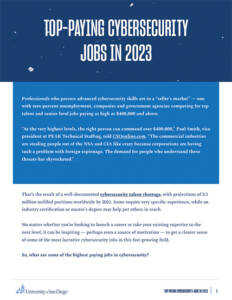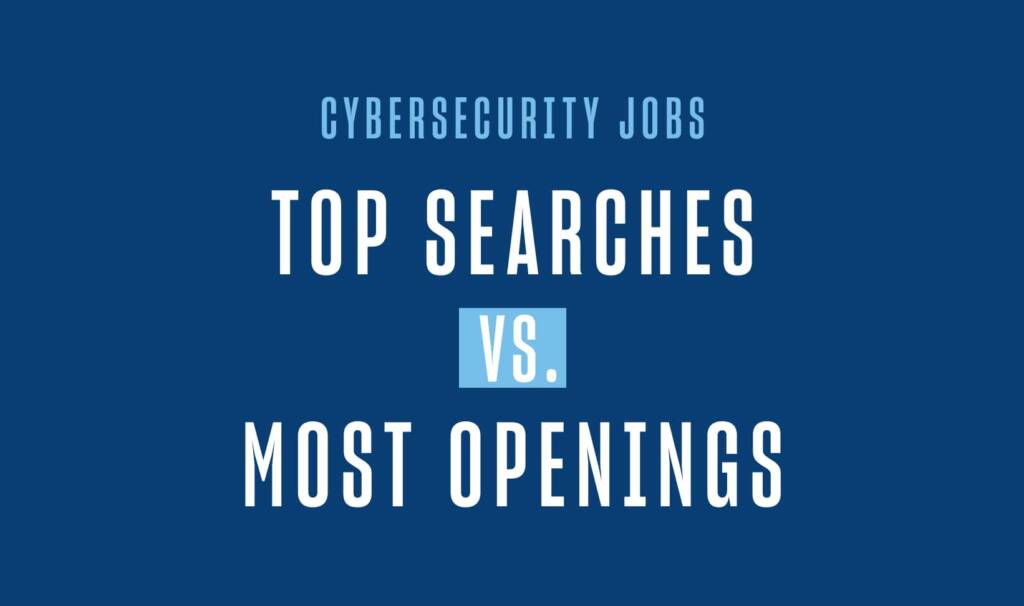Do you think like a malicious hacker and a big-picture business IT executive? Because both of these mindsets are needed to be an effective cybersecurity architect — an in-demand position with salaries averaging $129,000 a year if you possess the required expertise and experience.
The job of cybersecurity architect is a senior-level position responsible for planning, designing, testing, implementing and maintaining an organization’s computer and network security infrastructure. The role requires thorough knowledge of the employer’s business and a comprehensive understanding of the technology it uses to conduct operations.
Several key attributes of an effective cybersecurity architect include:
- The ability to think like a malicious hacker to anticipate and defend one’s organization against information security risks
- The ability to think like a business executive, manage security team members and communicate effectively with key stakeholders
- The experience and technical expertise to build security infrastructure from scratch or update existing systems in response to ongoing changes in the security landscape, including new risks and adherence to applicable regulations
Also referred to as a security architect or information security architect, the position is a sought-after role for seasoned IT professionals. An industry-wide cybersecurity skills gap means there is high demand for cybersecurity architects and that companies are paying high salaries to those who are qualified to thrive in this essential role.
According to CyberSeek.org, a website that provides information and resources to “help close the cybersecurity skills gap,” the role of cybersecurity architect pays an average annual salary of $129,000.
This post will examine cybersecurity architect job responsibilities, skill sets, career paths, salaries, certifications and more.
[RELATED] 10 Reasons to Join a Cyber Security Master’s Degree Program >>
Cybersecurity Architect Job Responsibilities
The duties of a cybersecurity architect may differ by industry and according to a company’s unique needs, but core responsibilities customarily include the following:
- Develop a complete understanding of a company’s technology and information systems
- Design, build, implement and support enterprise-class security systems
- Align organizational security strategy and infrastructure with overall business and technology strategy
- Identify and communicate current and emerging security threats
- Design security architecture elements to mitigate threats as they emerge
- Plan, research and design robust security architectures for any IT project
- Perform or supervise vulnerability testing, risk analyses and security assessments
- Create solutions that balance business requirements with information and cybersecurity requirements
- Identify security design gaps in existing and proposed architectures and recommend changes or enhancements
- Review and approve installation of firewall, VPN, routers, IDS scanning technologies and servers
- Test security systems to ensure they behave as expected
- Use current programming language and technologies to writes code, complete programming and performs testing and debugging of applications
- Provide supervision and guidance to a security team
- Define, implement and maintain corporate security policies and procedures
- Train users in implementation or conversion of systems
- Respond immediately to security-related incidents and provide thorough remedial solutions and analysis
- Regularly communicate vital information, security needs and priorities to upper management
Cybersecurity Architect Career Paths
Within an organization’s IT hierarchy, the position is higher up the org chart than a security engineer or analyst and below a chief technology officer (CTO), chief security officer (CSO) or chief information security officer (CISO).
[RELATED] Chief Security Officer — High Demand, ‘Skyrocketing’ Pay for CSOs
To qualify for a senior-level position that includes security team supervision and effective ongoing communication with C-level executives, a cybersecurity architect typically must have at least five years of experience in information security roles. For some, the career path might include several of the following steps along the way.
Entry-level security positions such as:
- Security Administrator
- Network Administrator
- System Administrator
Intermediate-level positions such as:
- Security Analyst
- Security Engineer
- Security Consultant
- Security specialist
Regarding potential pathways to a cybersecurity architect career, Cyberseek.org also lists cyber crime analyst/investigator, incident analyst/responder, and penetration and vulnerability tester.
Cybersecurity Architect Skills
In terms of required skills and competencies needed to work in this role, CSOonline provides an excellent rundown in a story that dissects the job description of an information security architect. Key requirements include:
Experience
- Utilizing emerging technologies to design and implement security solutions; monitoring and improving those solutions while working with an information security team
- Consulting and engineering in the design and development of security best practices; implementation of security measures to meet business goals, customer needs and regulatory requirements
- Security considerations of cloud computing, including data breaches, hacking, account hijacking, malicious insiders, third parties, authentication, APTs, data loss and DoS attacks
- Identity and access management; tracking and creating/enforcing policies that govern access sensitive technology resources and information assets
General skills
- Outstanding communication skills; strong critical thinking and analytical skills
- Strong leadership, project and team-building skills, including the ability to lead teams and drive initiatives in multiple departments
- Demonstrated ability to identify risks associated with business processes, operations, technology projects and information security programs
- Ability to function as an enterprise security subject matter expert who can explain complex topics to those without a technical background
Technical skills and knowledge:
- Windows, UNIX and Linux operating systems
- VB.NET, Java/J2EE, ColdFusion, API/web services, scripting languages and a relational database management system (RDBMS) such as MS SQL Server or Oracle
- Thorough understanding of relevant industry security standards and protocols including ISO27001 and National Institute of Standards and Technology (NIST); Control Objectives for Information and Related Technologies (COBIT); Committee of Sponsoring Organizations (COSO) of the Treadway Commission, a joint initiative to combat corporate fraud
- The ISO 27001 specifications for an information security management system
- Router, switch and VLAN security; wireless security
- Risk assessment procedures, policy formation, role-based authorization methodologies, authentication technologies and security attack pathologies
A day in the life of a cybersecurity architect varies greatly, of course, but a Medium.com article (“What is a Security Architect?”) by Robert Clark, a cloud security expert who writes about what he looks for when hiring security architects, provides a helpful inside look at the job.
In a section titled, “Qualities every Security Architect should have,” Clark discusses the job interview questions that his team uses to assess security architect candidates and offers specific insight into what employers might be looking for.
“I look for architects who can understand what organizations need to protect, who they need to protect it from and how that protection should work,” says Clark. “Bonus points if the architect can walk through threat classification frameworks like STRIDE or risk assessment models such as DREAD.”
See What a Cyber Security Masters Program Looks Like for Working Professionals
Cybersecurity Architect Jobs and Salaries
The high average salaries paid to cybersecurity architects reflect both the considerable skills and experience required, as well as the overall shortage of top-level cybersecurity talent. The following average salary and pay range data is listed at the employment website payscale.com:
- Security Architect:
- Average salary $121,600
- Pay range $84,000–$156,000
- Senior Security Architect
- Average salary $144,716
- Pay range $113,000–$170,000
A recent review of security architect, cybersecurity architect and information security architect positions listed on LinkedIn revealed a wealth of opportunities at major employers throughout the country, including:
- Apple, Amazon, Microsoft, Google, Salesforce
- Goldman Sachs, Morgan Stanley, Dun & Bradstreet
- Aetna, Blue Cross Blue Shield, Prudential Financial
- McDonald’s, Walt Disney Company, Bayer
- Expedia, Delta Air Lines, Mastercard, Visa, PayPal
- And countless others across all industries
Cybersecurity Architect Certifications and Educational Requirements
Certifications play a vitally important role in the cybersecurity industry; they teach new skills, enable IT professionals to build upon their existing experience and expertise, and certify levels of competency to prospective employers.
Several of the most notable certifications for cybersecurity architects and related professions include:
- Certified Information Systems Security Professional – Information Systems Security Architecture Professional (CISSP-ISSAP)
- Certified Information Systems Security Professional (CISSP)
- Certified Information Security Manager (CISM)
- Certified Information Systems Auditor (CISA)
- SANS-related certifications such as GIAC Defensible Security Architecture (GDSA)
In terms of academic achievement, most organizations require their security architects to have at least a bachelor’s degree. According to the job description at CSOonline, “a master’s degree in an IT field is a plus, and a master’s in cybersecurity is an even bigger plus.”
Due to the increasing demand for security architects and other cybersecurity professionals, more colleges and universities are now offering bachelor’s and master’s degree programs — both on-campus and online.
What Are Some Other Top Cybersecurity Careers?
Cybersecurity is a fast-growing, high-paying field with a range of different types of job openings. Which role might be ideal for you? Take a moment to explore some of the other exciting careers in cybersecurity:
Chief Information Security Officer (CISO)
Want to see the top paying jobs in cybersecurity? Read this article.
Want to see the top entry level jobs in cybersecurity? Read this article.
Want to see the top non-technical jobs in cybersecurity? Read this article.
Want to learn how to land the best jobs in cybersecurity? Read this article.






